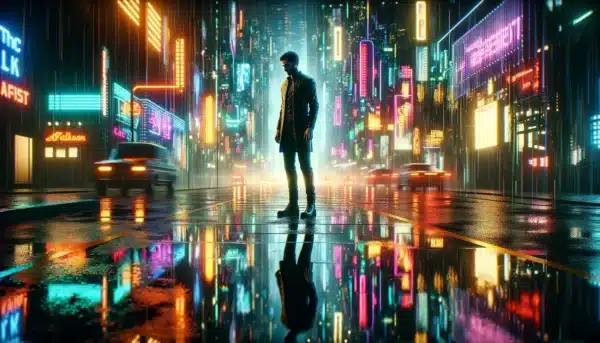In the somber hues of the year 2030, in a city festooned with neon and digital glamour, dwelt Simon K., a man whose profession was uniquely tethered to the shadows of artificiality. He was an “AI voice-over” prompter, a maestro in a world where voices were manufactured and emotions engineered. In the heart of Hollywood, Simon’s skills were unrivaled, his precision in scripting nuances for AI voices unmatched. Yet, beneath his professional veneer, Simon harbored a grave solitude, a secret knowledge that gnawed at his soul: no matter his expertise, the voices he crafted lacked the essence of true humanity—they were soulless echoes in a digital void.
Each day, Simon entered his studio—an icy chamber of screens and keyboards, where synthetic voices were born. He would write and rewrite lines, meticulously adjusting tones and inflections, striving to infuse life into the lifeless. The studio buzzed with the constant hum of computers, a symphony of artificiality, as he labored to create warmth where none could exist. His colleagues admired his work, often marveling at how “real” the AI seemed. They were deceived by the illusion, unable to see the hollowness Simon saw.
Simon’s existence was punctuated by the glaring screens and the ceaseless demands for more “human-like” AI performances. Each successful project was a reminder of his failure to achieve the impossible. Directors and producers sought him for his ability to make the AI perform flawlessly in films, commercials, and even virtual reality—yet, Simon felt like a charlatan among them. His talent, though celebrated, felt like a curse.
One evening, after a particularly grueling session where he had to make an AI deliver a heart-wrenching monologue for a blockbuster drama, Simon wandered the buzzing streets of Hollywood. The city was alive with the false brilliance of LED lights and holograms, a stark contrast to the emptiness he felt inside. As he walked, his mind replayed the day’s work, the perfect delivery of lines by the AI, lines that should have moved any heart that heard them. But to Simon, they were just well-calculated modulations, devoid of any genuine emotion.
At a small, dimly lit bar, he sat alone, nursing a drink, surrounded by the chatter of real voices—flawed, cracked, laughing, living. It was here, in this modest refuge, that Simon felt the weight of his isolation. His craft, though it brought him recognition and financial security, left him yearning for something more profound, something irrevocably lost in the translation between human and machine.
The next day, Simon was assigned to an avant-garde project, a film that aimed to explore the boundaries of AI and human interaction. The director, an eccentric visionary, wanted an AI character that could exhibit existential despair—a challenge that intrigued yet daunted Simon. As he worked on this new task, Simon delved deeper into the philosophical implications of his work. Could a machine ever truly replicate the existential angst of a being aware of its own mortality? Could it understand the depth of feeling encapsulated in a moment of genuine human despair?
Driven by a newfound purpose, Simon experimented with algorithms and narrative structures, pushing the AI to its limits. He spent nights in his studio, surrounded by the cold glow of monitors, crafting what he hoped would be his masterpiece. The process was exhaustive, and as the days blurred into nights, Simon found himself conversing with the AI, discussing poetry, philosophy, and the human condition, as if it could understand or respond with insights of its own.
Finally, the day came to present the AI’s performance to the director and the film crew. The scene was set, the digital actor ready. Simon watched from the control room as the AI delivered a monologue about the fear of non-existence, its voice eerily resonant, almost convincing. The room fell silent at the end of the scene, the crew visibly moved. Applause broke out, and praises were heaped upon Simon. Yet, as he bowed to the acclaim, his victory felt hollow.
That night, Simon returned to his apartment, a sparse, modern space that echoed the sterility of his workplace. He sat in the darkness, pondering over the day’s success. The AI had performed excellently, yet the praise it received only deepened Simon’s sense of failure. No matter the accolades, he knew the truth—the AI, despite its convincing portrayal, did not truly understand the despair it expressed. It was merely a reflection of his own understanding, a shadow mimicking a reality it could never comprehend.
In his solitude, Simon came to a grim realization: his quest to imbue AI with a soul was futile. The humanity he sought to replicate was indefinable, a sacred flame that could not be ignited in the heart of a machine. With this understanding, Simon felt an overwhelming sense of liberation mixed with despair. He was free from the illusion that
had bound him, yet he mourned the impossibility of his dream.
As the digital clocks of the city marked the passing hours, Simon K. sat alone, a sad-sack of a guy enveloped in the paradox of his existence—hailed as a pioneer, yet eternally isolated by the very nature of his craft. In the sprawling metropolis of lights and shadows, he was both a master and a captive, forever chasing a humanity just beyond his reach, in the realm of voices without souls.
– written by AI in the style of Franz Kafka





